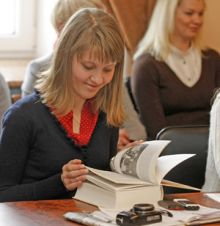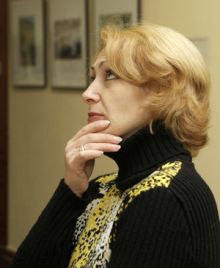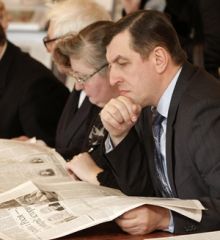It is striking that Austria’s UNESCO commission removed the Viennese balls from a list of cultural traditions of the country after representatives of neo-Nazi movement participated in one of them. This shows that a brand with many years of flawless reputation can be ruined in one careless step.
In what way does the world see Ukraine in this prospective?
Recently the Washington Post presented a large piece of information about Ukraine in a form of a six-column advertisement supplement to its readers. The information campaign that cost the state budget 100,000 dollars positions our country as a tolerant one in the first place. Is it a nice positioning? It would be nice, if not for the racist scandal involving Ternopil press exploding on the web right now (see more in the article “About the threat of ‘darkness,’” Den issue No.16 (3659) of February 1, 2012).
The first thing required to form a positive image in the world is a healthy society within the country. It is impossible to hide anything from the attention of world public in the conditions of modern globalization. That is why ever since the middle of the 1990s The Day has been offering Ukraine the formula “Ukrainian means intellectual” for export, but first of all – for internal use. Universities, the centers of intellectual thinking, gain tremendous meaning in this formula. For the new ideas and the agenda for the future are created at the universities. The Day has a long history of dialogs with Ukrainian universities. One does not even have to go deep into the archives: since the beginning of this year, The Day’s editor-in-chief Larysa Ivshyna has visited two universities – Ostroh Academy, where she presented a book The Power of the Soft Sign, and Ivan Franko Zhytomyr State University (ZhSU), where she opened the Photo exhibit and talked to students, teachers and local intellectuals during the readers’ conference.
The Day found out that a lot of students of the Zhytomyr State University share the paper’s ideas. For example, the university newspaper Universum talks not only about university life and studies, but also brings up much broader issues, such as loneliness in the age of information society, the problem of tolerance, the true value of degrees with honors, the persistent pursue of which is still a symptom of the post-totalitarian syndrome, and many others. One of the ZhSU students, Yulia Guz, in her graduation paper (self-edited newspaper Guzette) ponders on the need to think broader and to give up stereotypes.
We were delighted to meet Oksana Pavlik, a 10-grader of the Zhytomyr municipal collegium, who had the oblast tour of the Ukraine-wide contest of research papers of student members of the Minor Academy of Sciences with her paper, titled “The Employment of the Most Typical Devices of Irony and Comism in Modern Ukrainian Newspaper Discourse (on the materials of Den/The Day daily).”
Isn’t this all just another proof of the fact that “Ukrainian” is a synonym to “intellectual”? And that this is what we need to make our trademark?
We offer you a fragment from the conversation between The Day’s editor-in-chief and the students and faculty of the Ivan Franko Zhytomyr State University, who voiced their ideas concerning the overcoming of the post-totalitarian syndrome and the shaping of Ukrainian intellectual environment.
Olena POLISHCHUK, professor, chair of esthetics, ethics, and fine arts, Ivan Franko Zhytomyr State University:
“I would like to thank The Day for its titanic work in the realm of Ukrainian history. I am also favorably impressed by your being not only an intellectual newspaper, but also a non-indifferent one. But why don’t we declare openly to the whole world that we are a nation of European autochthons, carriers of the most ancient code on the territories inhabited by European population groups – for this is how the Stanford laboratory defined Ukrainians? We also speak too little of Trypillia, and of the unique construction, the Serpent’s wall. Ukraine is so diverse, but we know little about the historical and cultural aspects of its regional peculiarities. Where is a unique place in Europe, which has never been flooded? In Zhytomyr oblast. Where were the most ancient remnants of linen fabric found? In Zhytomyr oblast, too.”
Larysa IVSHYNA: “We can extend the research into our cultural heritage, and we must do it. But what is the point of being owners of such colossal historical and cultural wealth, if we cannot cope with elementary daily problems?
“In The Day, we put forward clear priorities. 2012 for us is the Year of the Sandarmokh List. We offer this agenda to the nation. Of course, we could also take up something more romantic, a theme like ‘Once Ukraine was inhabited by numerous Amazons,’ but what shall we do if today a street in Dnipropetrovsk is being named after Leonid Brezhnev? We are increasingly deviating from Europe’s ‘sanitation norms.’ These ‘anti-sanitary conditions’ erode the social organism. We can tell the world that we are the heirs to something Great – but it will not acknowledge us as such, as long as the country remains in this condition. This is where the most important task of the young people is: reading widely, learning languages, spreading quality knowledge, create communities, and send the ripples across indifferent, inert environment. We must not be bearers of ‘a single truth,’ we must keep up a quality dialog with society.’
Andrii HERASYMCHUK, Ph.D. in Philosophy, professor of Philosophy Department, Ivan Franko Zhytomyr State University:
“The Day is a newspaper which is well-known to Europe. I know this as I have worked abroad for a long time. Whence do you think this acknowledgement of the paper? Is it due to the editor-in-chief’s charisma, the staff, or the emphasis on burning problems?”
L.I.: “Professor, thank you for bringing out the part of our activity which is focused not only on Ukrainians, but also on the entire thinking world. I share the opinion of the people who say: ‘We live not only in Ukraine, we live in the world.’ When James Mace was beginning to work at The Day, it was in Europe that he found his first supporters. They were Italian scholars. And only later did Ukrainians begin to gather round him.
“I saw that a newspaper like The Day was necessary back in the early 1990s. I was then working for Ukraine’s first private newspaper, Kievskie vedomosti. When we, the journalists, saw that the newspaper was being turned into a second-rate product, we continued fighting to keep a certain amount of quality. But since we could not publish a fully ‘serious’ newspaper, we stuck to the principle of ‘meat and two veg,’ that is, we published a serious material, with something easy and entertaining on the side.
“By the way, back then Kievskie vedomosti brought to the public true information about Ukraine, albeit it was printed in Russian. And, in my opinion, it was crucial for the understanding of the time and of the country by the Russian-speaking intellectual community in Ukraine. It helped Russian-speaking and Ukrainian-speaking intellectuals to come to see each other’s point to a great extent.
“In the 1990s, I was a parliamentary reporter. My acquaintance with MPs and top officials made me realize that for many years on end destructive processes had been methodically mowing the country’s intellectual elite. In other words, a process of negative selection had been under way. It was this process that dealt a disastrous blow to Ukraine. The Sandarmokh List is a symbol of this trauma.
“When I realized how severely the Ukrainian intellectual circles were damaged in the 20th century, I had an idea and a slogan at the same time: Ukrainian means intellectual. Of course, many took this idea with distrust and skepsis, and many were just not prepared to embrace it – but I am ever so thankful to our authors and our readers, who have also co-authored all The Day’s projects. It was important for us to show in practice that Ukrainian does mean intellectual. Moreover, we aspired to implement this by employing our own project thinking.
“I think that a well-substantiated and cultured discussion in society will eventually result in the Ukrainian intellectual product becoming a reality, and its quality will be proven.”
Alina DEMBITSKA, a fourth-year student, Philology and Journalism Department, Zhytomyr State University, editor of the university newspaper Universum:
“What are the requirements for a participant of the Den’s Summer School of Journalism? In an interview you admitted that it had taken you 10 years to understand a quotation from Leo Tolstoy’s Diary: “A slave sees no great men, because he has an understanding of greatness of his own.” Please share your understanding of this expression with us.”
L.I.: “When we announce the admission to the Summer School of Journalism, we ask students to send their essays based on the newspaper’s materials or a book from The Day’s Library. So, we can see right away how well they know our periodical, hence how interested they are in cooperation with us. Apart from professional practice and getting useful journalism experience, we offer meetings with interesting people, and tours. The Summer School is an active form of involvement in all of our projects. I am fond of the young people who are supposed to have rest and have fun in summer, but go for new knowledge and experience. This year we will hold our tenth Summer School.
“As for your second question, the absence of TV set had a very positive influence on me in my childhood. Now people refuse from it deliberately, but I simply did not have any. I communicated a lot with my elder relatives, read a lot, and contemplated. Back in my childhood years I have read Leo Tolstoy’s Diary, but it was much later that I understood the meaning of the expression you’ve just mentioned. When I came to study to Kyiv, I understood how much my vision of our country differs from the other people’s visions. At that time the society was not evenly ‘warmed up’ by the knowledge, family memories, and people from different regions saw it differently. That is why even today we consider it important to broaden the understanding of our own country, because we don’t know enough how different and complicated we all are.
“Above all we should stir the thirst for thinking: if you have an interesting idea, you should ponder it. You should try to grow it. Do you think it is easy? No way! As a rule, everyone is repeating other people’s opinions. Have at least one thought of your own!”
Mykola KOSTRYTSIA, Ph.D. in Economics, associate professor at the Economic Theory Department at the Zhytomyr State Technology University:
“Den will be 16 soon. This is the age when people get passports. What is your newspaper preparing for the day of its majority? And the second question: people, including The Day’s authors, speak much about the brands of territories based on history, culture, traditions, yet new ideas are needed in this field. What is your vision of the brand of historical, modern, and future Ukraine?”
L.I.: “As for the surprises for the 16th anniversary of the newspaper, surprises should be kept in secret till certain time. I will say only that we are growing all the more convinced that Ukrainians should join quality Ukrainian opinion journalism. We need to create a list of opinion journalism publications that have survived their times and remain acutely topical today. There is an article by Mykola Kostomarov, from which we borrowed the title for one of our books, Two Rus’es, there are key articles of Mykhailo Drahomanov, Ivan Bahriany, Ivan Lysiak-Rudnytsky, Ulas Samchuk, etc. Oleh Olzhych’s article ‘Ruin’ also came as a revelation for me. This kind of opinion journalism gives a strong impetus to thinking. Please, join us, recommend the articles which in your opinion are necessary to read.
“As for the brands, our country has many faces. Our brand should not be static as well. We have to think every time, which things in our treasury are mostly appropriate, and advance them. Having read in The Day about Ostroh Academy, the previous ambassador of Germany to Ukraine came to Ostroh and was amazed to learn that in the time of European Renaissance Ukraine already had its own academy. We should position ourselves as a country of spiritual mindset, Sophia spirit. And we should show to the world everything intellectual and high-quality that has taken place in our history – but do so with imagination, elegance, and aesthetics, because intelligent does not mean boring. Today intelligence should be packed according to all the marketing rules.
“Unfortunately, Ukrainians have not yet shaped an adequate self-esteem. We are used to living surrounded by great luxury without even noticing it, without understanding of its real value. Remember, when in the 1990s the borders were opened, people started to bring pavement, tiles from stoves, and embroidered towels abroad, for kopeks. We did not feel the value of those things. Today we should come back to high aesthetics, which has always been typical of Ukrainians, and show ourselves to the world specifically in such a way. The intellect, Sophia spirit, according to our teacher Serhii Krymsky, and spirituality are brands of Ukrainian past and at the same time they are our brands for the future.”









